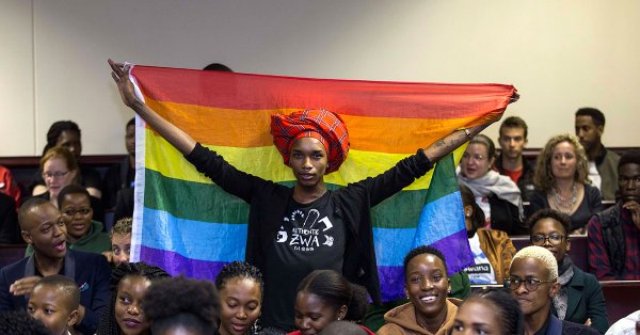 [Photo: GlobalCitizen.org]
[Photo: GlobalCitizen.org]
In a milestone victory for gay and lesbian rights, Botswana became the first country in Africa to decriminalise homosexuality through the courts on 11 June when the British colonial-era ban was overturned.
The unanimous ruling in Motshidiemang v Attorney-General was met with shouts of joy as the Gabarone high court declared that section 164 of the penal code, which imposes up to seven years in prison for ‘carnal knowledge of any person against the order of nature’, and s.167, which makes ‘acts of gross indecency’ punishable by up to two years – even if the supposed crime was in private – were discriminatory, unconstitutional and against the public interest. Justice Michael Leburu said: ‘Discrimination has no place in this world. All human beings are born equal. Homosexuality is another form of sexuality that has been suppressed for years.’
Anna Mmolai-Chalmers, of the campaign group Lesbians, Gays, Bisexuals of Botswana (LEGABIBO), said: ‘This incredibly life-changing decision, although it does not right wrongs done to individual members of the LGBT community, it is a step to restoring our dignity as human beings.’ Muleya Mwananyanda, of Amnesty International, declared: ‘Today’s court judgment sends a strong message that no one should be harassed, discriminated against or criminalised because of their sexual orientation.’ Neela Ghoshal, of Human Rights Watch, told CNN that the ruling set a ‘powerful precedent on the continent’, adding: ‘Sodomy laws belong in a museum.’ Gautam Bhatia, a Delhi-based lawyer and legal commentator, praised the judgment’s ‘powerful and eloquent defence of the rights of privacy, dignity, freedom and equality’ and concluded: ‘Across the world, the fact that sodomy laws have no place in liberal democracies is increasingly becoming part of judicial common sense.’
However, some members of the public in Botswana interviewed by Mmegi had very hostile reactions. Tomeletso Setlhora said: ‘This new law disgraces us … It shows that we as Batswana are losing touch with our culture.’ Emmanuel James said: ‘People are copying what they see in foreign countries. Being gay or lesbian is more of a lifestyle now.’ But Letsweletse Motshidiemang, 24, told the Christian Science Monitor that he had filed the case ‘so people like me don’t need to feel like who we are is a crime’. It was, the student said, ‘something I had to do for my community’.
Mmegi said the ruling was the culmination of a long-term strategy by LEGABIBO and the Southern African Litigation Centre: ‘A key component of this strategy was to incrementally litigate less controversial cases affecting the rights of LGBT persons before tackling more controversial issues, to create a “fertile” judicial environment where decriminalisation of same-sex sexual conduct could take place.’ Two landmark cases in Botswana came in September and December 2017, when the courts ordered the government to recognise transgender individuals’ gender identity. Equally significant was a speech last December by Botswana’s president, Mokgweetsi Masisi, condemning homophobic abuse. ‘Many people of same-sex relationships in this country … have been violated and have also suffered in silence for fear of being discriminated,’ he said. ‘Just like other citizens, they deserve to have their rights protected.’
Reading the three judges’ ruling, Leburu also said: ‘Societal inclusion is central to ending poverty and fostering shared prosperity.’ This point has been examined by Prof MV Lee Badgett, at the University of Massachusetts Amherst, who sees an economic imperative driving greater inclusivity. Writing in The Atlantic, she calculated that stigmatising LGBT people cost India up to 1.4% of national output – $26bn. By contrast, she added: ‘Countries that come closer to full equality for LGBT people have higher levels of GDP per capita over the 22 years we studied.’ Writing for Global Risk Insights, Mduduzi Mhlanga also saw an economic upside to decriminalisation. HIV rates would fall in the long-term, he argued, as declining stigma around the LGBT community encouraged testing, safe sex and use of antiretrovirals. Furthermore, he argued, the boost to democratisation from decriminalising a large slice of the population would draw foreign investment, which has been shown elsewhere to accelerate economic growth (eg. Christopher Malikane and Prosper Chitambara in African Development Review).
Sydney Pilane, acting for the attorney-general in the Motshidiemang case, argued that homosexuality was unAfrican and at odds with traditional Batswana values, the Midweek Sun reported. Yet there is much evidence that pre-colonial African societies accepted homosexuality. In the Journal of African Law, AJGM Sanders noted how homosexuality, including lesbianism, was recognised until missionaries repressed it, while in Boy-Wives and Female Husbands, Stephen Murray and Will Roscoe cite evidence from some 50 African societies ‘that same-sex practices and patterns were “traditional”and “indigenous”’.
Whereas South Africa decriminalised homosexuality by outlawing discrimination on the grounds of sexual orientation in its post-apartheid constitution, the Botswanan court has set a precedent for Africa’s judiciary. Amnesty’s Mwananyanda hoped it would ‘inspire other African countries to follow suit’, but Kenya’s high court, which unanimously upheld the constitutionality of discrimination against homosexuality in May, has shown that the struggle for equality is far from over. The Kenyan court cited a 2003 case in Botswana, Kanane v the State, which said the moment had ‘not yet arrived to decriminalise homosexual practices’. In 2019, however, Botswana’s judges decided the time had come, declaring: ‘As society changes, the law must evolve.’



